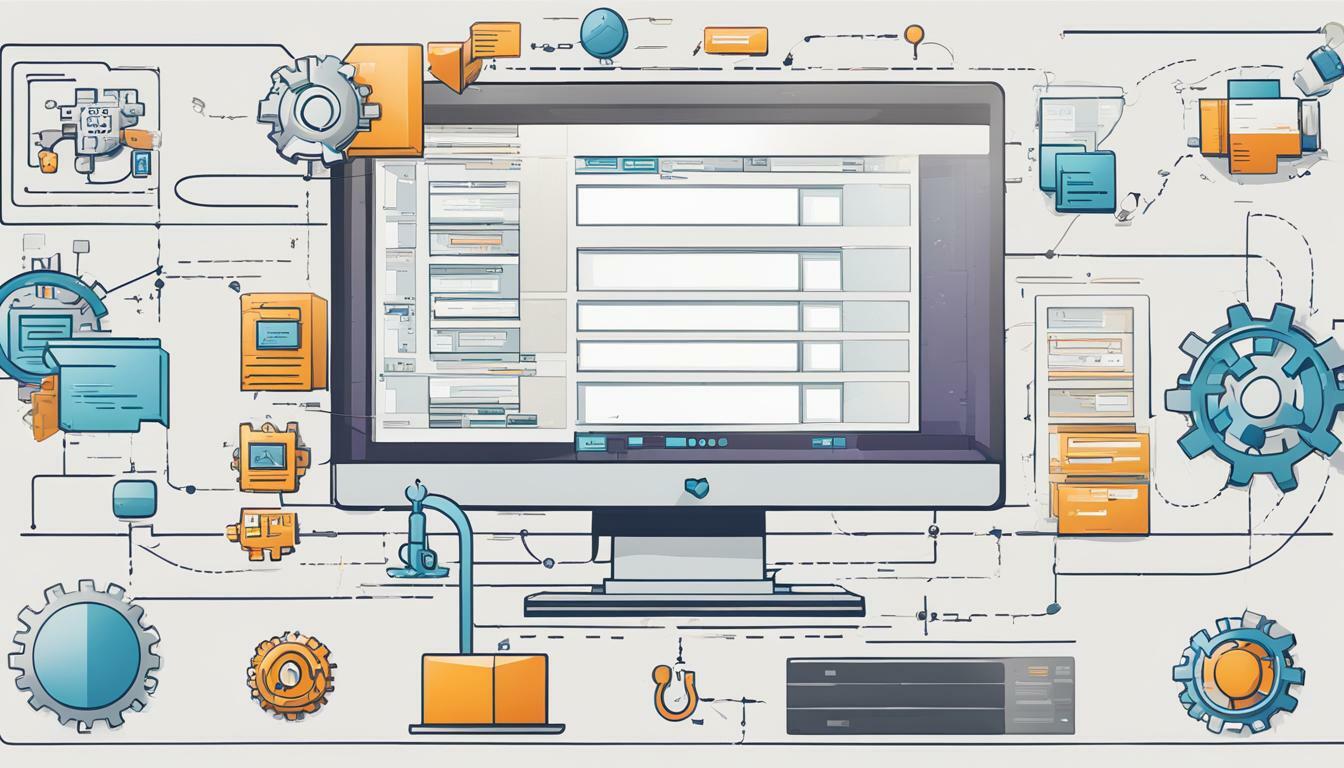
Software development can be a complex and time-consuming process, requiring developers to execute numerous repetitive tasks daily. Macros offer a powerful solution to this problem, enabling developers to automate these tasks and free up valuable time to focus on more complex challenges.
Macros are essentially a set of instructions that automate repetitive tasks in software development. They can be programmed to execute sequences of commands, reducing the need for manual effort and streamlining the coding process.
In this article, we will explore the benefits of macros in software development, highlighting how they can enhance productivity, efficiency, and code quality. We will also examine the process of implementing macros in development environments, exploring the tools and languages needed to create and execute macros.
Key Takeaways
- Macros automate repetitive tasks in software development, freeing up developer time to focus on more complex challenges.
- Macros can enhance productivity, efficiency, and code quality in software development.
- Developers can implement macros using a variety of tools and languages, depending on their preferences and requirements.
Understanding Macros in Software Development
In software development, macros are a set of instructions that can be recorded and executed to automate a repetitive task. Macros are designed to reduce manual effort and save time in the coding process, allowing developers to focus on more complex tasks.
Macros are created by recording a series of keystrokes and mouse clicks or by writing custom code. Once created, macros can be executed with a single command, reducing the time and effort required to perform repetitive tasks.
Benefits of Macros in Software Development
Macros offer significant benefits to software developers by automating repetitive tasks and improving productivity. Let’s take a closer look at some of the key advantages of using macros in software development:
Save Time and Reduce Errors
Macros can help developers save time by automating repetitive tasks, such as generating boilerplate code or running tests. By reducing the manual effort required for these tasks, macros can also help reduce errors, especially when performing tedious or complex operations.
Enhance Code Readability
Macros can also improve code readability, making it easier to understand and maintain. By abstracting away lower-level details and providing higher-level abstractions, macros can help simplify code and make it more modular and reusable.
Enable Focus on Complex Tasks
By automating repetitive tasks, macros enable developers to focus on more complex tasks, such as debugging, performance optimization, or designing new features. This enables developers to become more productive and efficient, as they can prioritize their time and effort on tasks that require their expertise.
Improve Coding Quality
By reducing manual effort and errors, enhancing code readability, and enabling focus on complex tasks, macros can improve overall coding quality. This leads to more robust, scalable, and maintainable software, which is critical for the success of any software development project.
Conclusion
As we can see, macros offer significant benefits to software developers, helping them save time, reduce errors, enhance code readability, focus on complex tasks, and improve coding quality. By leveraging the power of macros, developers can become more productive, efficient, and effective in their work, achieving better results and saving valuable time in their projects.
Implementing Macros in Software Development
Macros can be implemented in software development using various tools and languages. VBA (Visual Basic for Applications) is a popular language used for Excel macros, while AutoHotkey is commonly used for Windows automation macros. Notably, macros can be integrated into different development environments to automate repetitive tasks effectively, reducing the manual effort and enhancing productivity.
Implementing macros in software development follows a defined process. First, identify the repetitive tasks that need to be automated, and then determine the right macro language and tool to use. Next, create and test the macro code before executing it on software development tasks.
Using macros requires a basic understanding of programming concepts. Developers can use online tutorials, blogs, and forums to deepen their knowledge of macros and programming languages. Likewise, staying up-to-date with the latest macro technologies and software development trends is critical in implementing macros for automation in software development.
Enhancing Productivity with Macros in Software Development
Macros can have a significant impact on enhancing productivity in software development. By automating repetitive tasks, software developers can save valuable time and effort, enabling them to focus on more complex coding challenges. Here are some scenarios where macros can be particularly useful:
- Code generation: Macros can be used to generate code that is repetitive and time-consuming to write manually. This can include boilerplate code, initialization code, and more. By automating code generation, developers can reduce the risk of human error and improve code consistency.
- Debugging: Macros can assist with debugging by automating the insertion of breakpoints, logging statements, and other debugging tools. This can save developers time and simplify the process of finding and fixing bugs.
- Refactoring: Refactoring large codebases can be a challenging and time-consuming task. Macros can be used to automate some aspects of refactoring, such as renaming variables or functions. This can significantly reduce the time and effort required to refactor code.
By leveraging the power of macros, software developers can achieve significant productivity gains. According to research, using macros to automate repetitive tasks can save up to 30% of development time.
Streamlining Software Development with Macros
Macros are an essential tool in software development, helping developers increase productivity, streamline coding processes, and improve project management. By automating repetitive tasks and enabling team members to focus on more complex tasks, macros can drive efficiency in software development.
One key benefit of macros is that they can facilitate collaboration among team members. By standardizing coding practices, macros can ensure consistency and efficiency across software development projects. This can help reduce errors and improve overall quality.
Another advantage of macros is that they can help optimize the development workflow. By eliminating repetitive tasks, macros can save valuable time for developers and improve the speed of the development cycle. They can also increase code reusability, making it easier to work with existing code and reducing the need for rewriting similar code.
Finally, macros can improve project management by enabling developers to focus on the most important tasks. By automating time-consuming tasks such as code generation, debugging, and refactoring, macros can save valuable time and reduce the risk of burnout among team members. This can lead to improved morale and efficiency across the team.
Efficiency in Software Development through Macros
Macros are a powerful tool in software development, with the potential to significantly enhance efficiency. By automating repetitive tasks, macros can reduce the time and effort required for coding, freeing up developers to focus on more complex tasks. In this section, we will explore some of the ways in which macros can drive efficiency in software development.
Eliminating Repetitive Tasks
Writing code can often involve a lot of repetition, such as typing out the same lines of code or manually navigating through files and directories. Macros can automate these tasks, reducing the amount of manual effort required. By eliminating repetitive tasks, macros can save time and help developers work more efficiently.
Reducing Human Error
Manual coding can be prone to errors, particularly when working with complex codebases. Macros can help reduce human error by automating repetitive tasks and performing them consistently and accurately. This can lead to fewer bugs and a higher quality of code.
Increasing Code Reusability
Macros can also increase code reusability by automating the creation of code snippets and templates. This can save time in future projects by allowing developers to quickly and easily reuse common code patterns. By increasing code reusability, macros can help streamline the development process and improve overall efficiency.
Optimizing Development Workflow
When properly implemented, macros can optimize the development workflow by automating time-consuming tasks such as code generation, debugging, and refactoring. This can help developers work more efficiently and reduce the time required for project completion. Macros can also be used to standardize coding practices, making it easier for team members to collaborate and contribute to the software development process.
Conclusion
By automating repetitive tasks, reducing human error, increasing code reusability, and optimizing the development workflow, macros can be a powerful tool for driving efficiency in software development. Whether working on a small project or a large-scale development effort, software developers can benefit from leveraging the power of macros to save time and achieve better results.
Conclusion
Moving ahead, it is evident that macros are incredibly powerful tools for automating repetitive tasks in software development. They enhance productivity, streamline coding processes, and eliminate manual effort. By using macros, developers can save time, reduce errors, and focus on more complex tasks that require their unique skills and expertise.
It is crucial to understand the concept of macros and their role in software development. Implementing macros requires a basic understanding of programming languages and tools. However, once integrated, macros can significantly boost productivity and efficiency.
Macros can help standardize coding practices, facilitate collaboration, improve project management, and optimize workflow. They eliminate repetitive tasks, reduce human error, and increase code reusability. All these benefits contribute to the overall efficiency of software development teams and lead to better results.
In conclusion, we encourage software developers to leverage the power of macros to automate repetitive tasks and enhance their productivity. By using macros, developers can save valuable time, increase efficiency, and improve the quality of their software development projects.
FAQ
Q: What are macros in software development?
A: Macros in software development refer to predefined codes or shortcuts that automate repetitive tasks. They enable developers to simplify complex processes and save time by reducing manual effort.
Q: How do macros work in software development?
A: Macros work by replacing a specific code or sequence of commands with a shorter and more convenient version. When the macro is called, it automatically performs the predefined set of actions, eliminating the need for manual repetition.
Q: What are the benefits of using macros in software development?
A: Using macros in software development offers several advantages. They can save time by automating repetitive tasks, reduce errors by eliminating the need for manual input, and enhance code readability by simplifying complex processes. Macros also allow developers to focus on more challenging tasks and improve overall coding quality.
Q: How can macros be implemented in software development?
A: Macros can be implemented in software development using various tools and languages. Common options include integrated development environments (IDEs) that support macro functionality, programming languages with macro systems, or dedicated macro libraries. These tools provide the necessary capabilities to create, execute, and integrate macros seamlessly.
Q: How can macros enhance productivity in software development?
A: Macros can greatly enhance productivity in software development by automating time-consuming tasks. They can be used to generate code, assist in debugging, and facilitate refactoring processes. By leveraging macros, developers can significantly reduce manual effort and achieve faster results, ultimately increasing overall productivity.
Q: How can macros streamline the software development process?
A: Macros contribute to streamlining the software development process by promoting collaboration, standardizing coding practices, and improving project management. They enable team members to work more efficiently, ensure consistency across projects, and simplify complex workflows, resulting in a streamlined and efficient development process.
Q: How do macros improve efficiency in software development?
A: Macros improve efficiency in software development by eliminating repetitive tasks, reducing human error, and increasing code reusability. When properly implemented, macros can optimize the development workflow, allowing developers to work more efficiently and achieve better results in less time.







